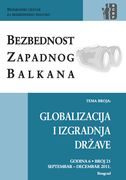Da li je globalizacija izazov ili pretnja nacionalnim državama kao dominantnom obliku političke organizacije?
Is Globalization A Challenge Or A Threat To Nation-States As A Dominant Form Of Polity?
Author(s): Nikola LakićSubject(s): Politics / Political Sciences
Published by: BCBP Beogradski centar za bezbednosnu politiku
Keywords: nation-state; globalization; governance; The Schumpeterian workfare post-national regime; RTB hypothesis; theories of growth; new security dilemma; non-space identities
Summary/Abstract: A true Nation-state has never yet existed in our diverse and vibrant world. For states to remain in the game, they need to under-stand they are no longer the only actor. The current policy arena is a kind of unstructured complexity in which a lot of actors are key for policy making. The descriptive label governance is used for the changing nature of the policy process. The dispersion of the power and activities of the state towards stakeholders at different spatial levels is the most visible change in the state, in a globalized world. The thesis about the end of the state is unsustainable. According to Poulantzas, a nation-state should be seen as ‘self-replaceable’. Economic globalization is seen as the force which most threatens the authority of the nation-state. The state's ability to act in opposition to market forces is devastated by the fact that the state must reduce regulatory standards in order to attract capital. The theory which satisfactorily reflects the nexus of globalization and reduc-tion of regulatory policy is the ‘race-to-the-bottom’ (RTB) hypothesis. In today’s globalized states, there is a trend towards subordinating social policy to the needs of structural competitiveness and the flexibility of the labour market. Such a state is called a Schumpeterian workfare post-national regime. Globalization causes the state to be unable to protect its population. Contemporary security threats and challenges, which are by nature transnational and largely a product of globalization, make nation-states vulnerable and interdependent. The result of globalization is also new non-space-based identities that do not derive from the nation-state.
Journal: Bezbednost Zapadnog Balkana
- Issue Year: 2011
- Issue No: 21
- Page Range: 6-17
- Page Count: 12
- Language: Serbian

